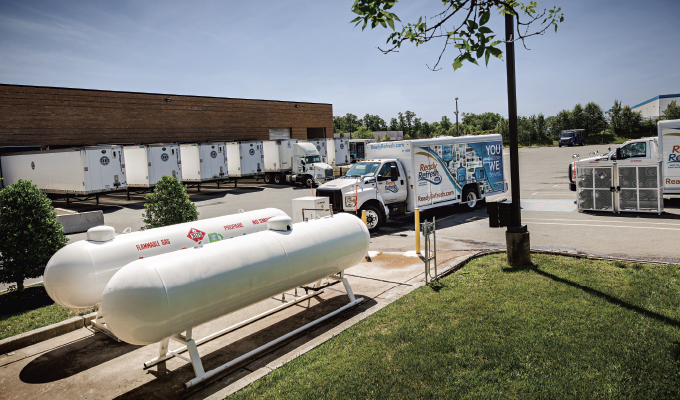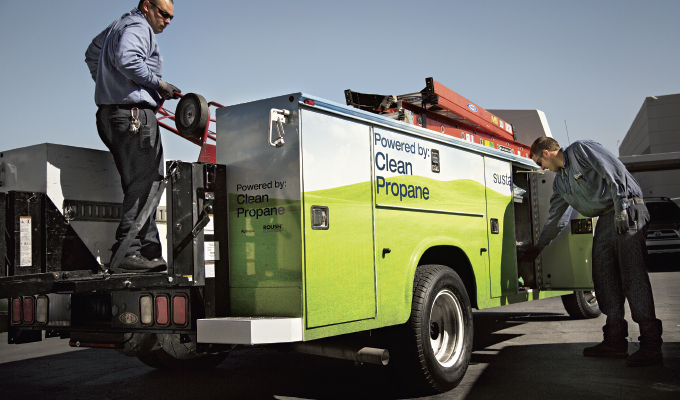Now, more than ever, fleet owners are considering a move to alternative energy sources like propane autogas. Clean energy sources not only help companies meet emission benchmarks, but also allows businesses to position themselves as mindful of the local environment to customers within their communities. Today’s propane autogas engines exceed emission standards and are 90% cleaner than EPA standards, reducing harmful nitrogen oxide emissions by up to 94%.
However, there’s still a misconception in the transportation industry that the move to a clean energy source must come with a hefty price tag. Fortunately, there’s one alternative energy source—propane autogas—that is providing reduced emissions along with the cost savings and duty cycle performance fleet owners require of their fleet today.
CUT FUEL COSTS
When you factor in the cost of a new vehicle, fuel, fluids, maintenance, and repairs, propane autogas has the lowest cost of any energy source for the lifetime of the vehicle. Propane autogas makes it easier for fleets to manage annual fuel budgets and cost objectives because, no matter how you approach it, propane autogas costs less than gasoline or diesel.
As oil prices fluctuate, propane autogas can beat gasoline or diesel on price per gallon by as much as 40%. The wholesale cost of propane autogas falls between the price of oil and natural gas, which are the fuel’s two sources. Because of this, propane autogas prices don’t fluctuate as sharply as other fuels, so fleet owners are able to manage fuel budgets and meet year-end objectives more easily.
COSTS & DOWNTIME
Another major advantage in using propane autogas is that the fuel doesn’t need added fluids and filters, which is a necessary and costly expense for other fuels, such as diesel. Additionally, since propane autogas is a clean energy source, the engine doesn’t require the expensive exhaust after-treatment systems diesel engines need to meet emission standards. Propane autogas has fewer residual contaminants in the oil that can damage engines, and there is also less carbon build-up on the valves, which means fleet owners can expect to see less downtime with their vehicles for unexpected maintenance issues that occur with the extra parts diesel vehicles require.
It’s highly likely that fleets adding propane autogas vehicles also won’t need to make costly modifications or upgrades to maintenance or garaging facilities, as can be the case with other alternative fuels. In fact, if buildings are code compliant for diesel and gasoline, there are often no infrastructure changes required. Segregation of major and minor repairs is not required either. Facility managers should always check with their local Authority Having Jurisdiction.

LEASING INFRASTRUCTURE
Affordable and scalable refueling infrastructure is another reason propane autogas vehicles boast the lowest total cost of ownership of any fuel. While there are options for fleet owners to utilize public stations around the US, or set up a temporary refueling solution with their propane supplier, most fleet owners choose to install a private station to refuel vehicles because fleets may have the option to own the infrastructure or lease it at low or no cost in exchange for a mutually beneficial fuel contract.
A standard or advanced private station can be perfect for both small and large fleets that require a centralized refueling station. Each option includes a propane storage tank and dispensers to meet the needs of the size of the fleet. The station can easily grow with the expansion of a fleet because it’s convenient and easy to add more dispensers and increase fuel storage capacity as demand increases. Propane suppliers and infrastructure providers will work with you to determine the best solution for your fleet.
With all the combined savings, some high-mileage fleets have observed a complete return on their investment in months instead of years.
ABOUT THE AUTHOR
Steve Whaley is the director of autogas business development for the Propane Education & Research Council. He can be reached at stephen.whaley@propane.com. For more information, visit www.propane.com.




